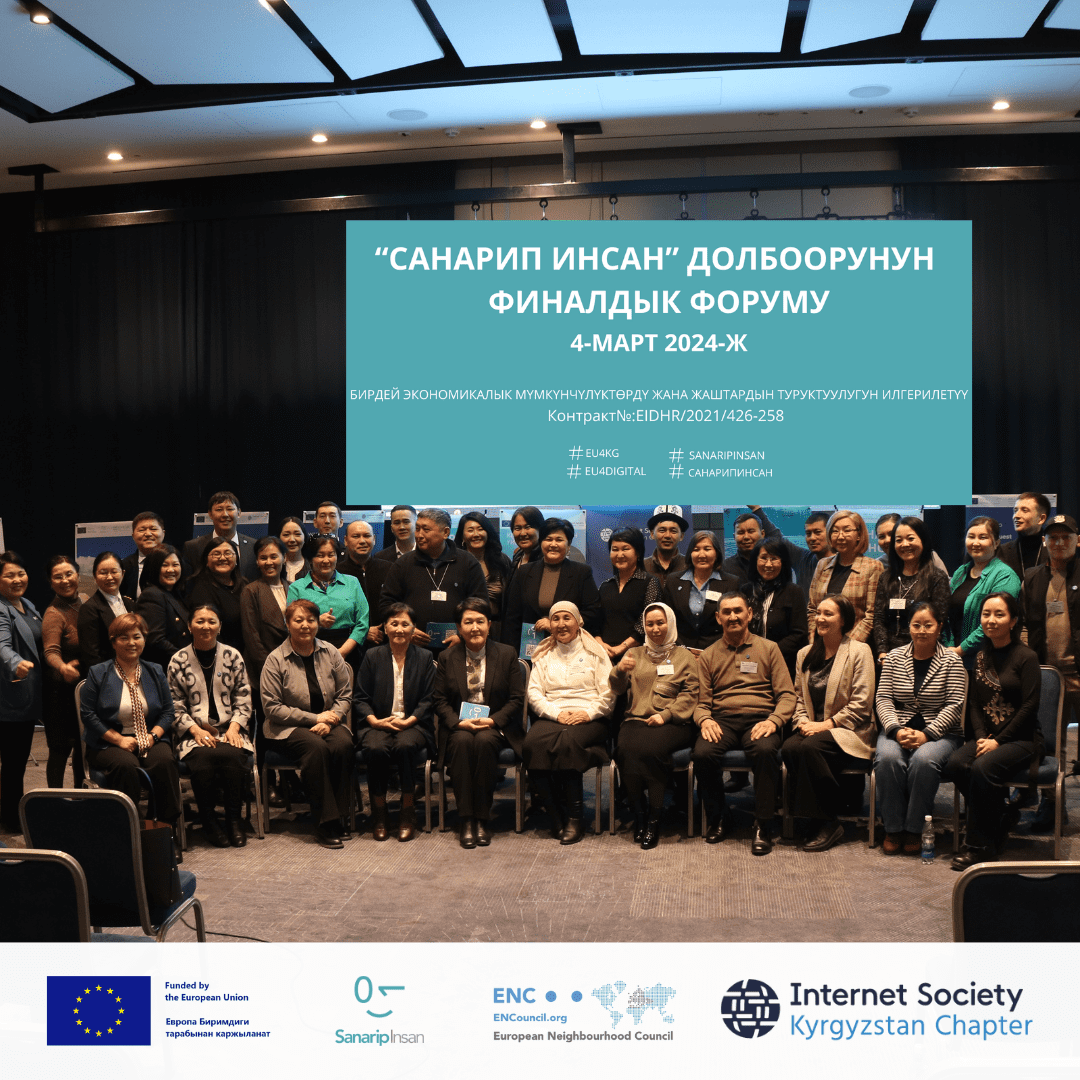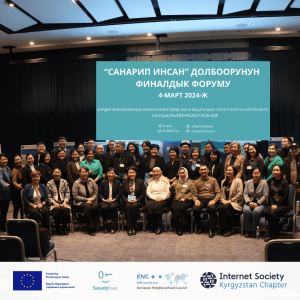
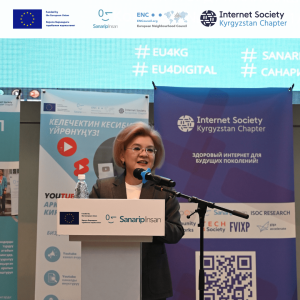
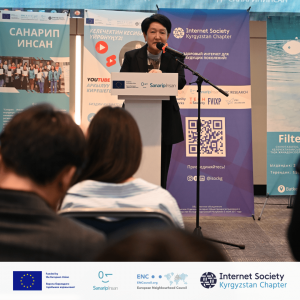
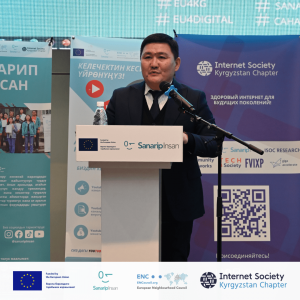
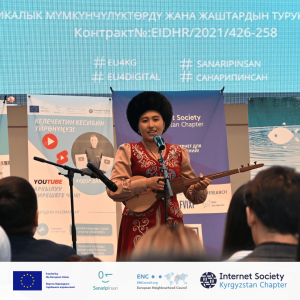
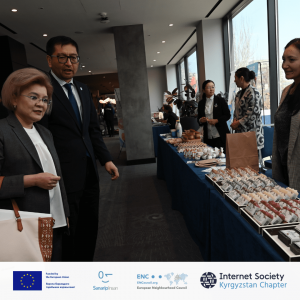
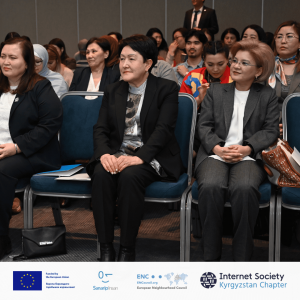
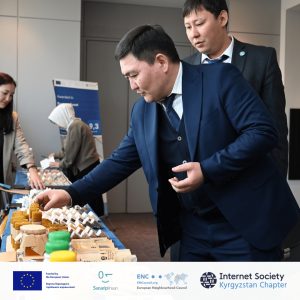
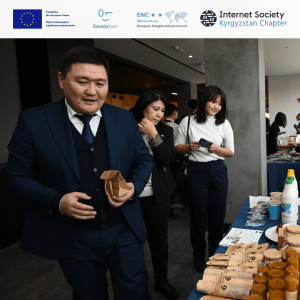
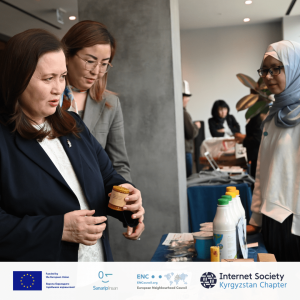
Проект “Санарип Инсан”, реализуемый при финансовой поддержке Европейского Союза, Совета Европейского Соседства (European Neighborhood Council) и Internet Society Kyrgyz Chapter (ISOC) прокладывают путь к инклюзивному росту и инновациям в Центральной Азии. Основная цель проекта – продвижение равных экономических возможностей и устойчивости молодежи и женщин в сельских регионах Кыргызстана для улучшения экономического благополучия через обучение цифровым платформам и повышению цифровой грамотности. Результатом деятельности проекта стало улучшение индикаторов защищенности молодежи по Целям Устойчивого Развития и защиты прав человека.
Сосредоточив внимание на трех ключевых областях — электронной коммерции, цифровом туризме и цифровом сельском хозяйстве – проект «Санарип Инсан» помог жителям регионов вооружиться цифровыми знаниями, которые повысили их экономическое благосостояние и способствовать устойчивому развитию.
4 марта прошел итоговый форум проекта “Санарип Инсан”.
«Основное внимание проекта уделяется регионам, и нам кажется, что в регионах очень мало возможностей для цифровых навыков, и еще меньше возможностей открывается для женщин и молодежи. Мы думаем, что расширяя их экономические и цифровые возможности, регионы будут развиваться быстрыми темпами», – подчеркнул Талант Султанов, директор и соучредитель ISOC Кыргызстан.
В соответствии с приоритетами правительства Кыргызстана по цифровизации, проект реализуется в тесной координации с различными министерствами и ведомствами. Совместные усилия с Министерством образования привели к разработке цифровых образовательных материалов, а партнерство с Министерством цифровизации и Министерством по делам молодежи обеспечивает комплексный подход к расширению цифровых возможностей.
«Проект «Санарип Инсан реализуется в течение двух лет. Сегодня на здесь представлена такая вот богатая выставка продукции, которые реализованы благодаря этому проекту. Повышены цифровые навыки, навыки бизнеса и повышение квалификации сотрудников различных проектов. Все это благодаря этому проекту, поэтому мы очень рады, что есть такие проекты как «Санарип Инсан», – подчеркнула министр цифрового развития Нурия Кутнаева.
Для повышения компьютерной грамотности один из фреймворков по цифровым компетенциям Microsoft Digital Literacy были полностью адаптированы, озвучены на кыргызском языке. Около 100 видеоматериалов и столько же презентационных материалов для учителей доступны на кыргызском языке.
«Санарип Инсан» сделал первый шаг в доступности языков программирования на кыргызском языке – перевел язык программирования Python, который доступен для каждого кыргызстанца.
«Язык программирования Python был переведен на кыргызский язык. Было создано 76 видеоуроков которые мы распространили в 2300 школ по всей стране. Теперь школьники в регионах, которые интересуются ИТ технологиями, могут самостоятельно обучаться. Наша цель на этот год – давать выпускникам аттестат по цифровым знаниям», – сказал на открытии форума Супаналиев Бекжан, заместитель министра образования и науки КР
Одним из главных достижений проекта стал конкурс стартапов для молодежи с общим призовым фондом 2.7 миллионов сомов (27500 евро). Так, поддержку получили 10 цифровых стартапов со всех регионов страны. 255 рабочих мест создано в результате акселерации стартапов и финансирования.
Цифровой туризм и электронная коммерция были важными компонентами проекта. В рамках этого проведены двухдневные курсы по всем семи областям Кыргызстана и обучили 500 человек, которые смогли создать 356 рабочих мест, в 11 раз больше, чем планировалось. Для повышения цифровой грамотности населения, проект в партнерстве с GSMA Foundation перевели руководство по обучению мобильной грамотности MISTT на русский и кыргызский языки. Видеоролики о выгодах использования цифровых платформ были показаны по национальным и региональным телеканалам – КТРК, ЭлТР, общий охват которых составил 2.5 млн человек, более 6 миллионов просмотров видео и 6 миллион прослушиваний подкастов за все время реализации проекта.
Проект помог тысячам граждан улучшить цифровые навыки, а значит, они улучшают свое экономическое благосостояние, и это привнесет инклюзивный экономический рост в селах Кыргызстана, что, в свою очередь, влияет на рост цифровой экономики страны.
Результаты к марту 2024
- 500 женщин и молодежи из сельских регионов прошли обучение цифровому туризму, электронной коммерции и использованию новых цифровых навыков для открытия, ведения бизнеса с минимальным капиталом; создано 201 новое рабочее место
- Программа Microsoft Digital Literacy Framework для цифровых компетенций была переведена и озвучена на кыргызский язык, включающая 100 видео и 100 презентаций для учителей. 25 из 50 университетов включили их в учебные программы, что принесло пользу 150 000 студентам – они повысили свои цифровые компетенции
- В партнерстве с Фондом GSMA инструментарий по мобильной грамотности MISTT был переведен на русский и кыргызский языки, локализован, напечатан в виде учебников, и сегодня доступен в электронном виде, также распространялся по ТВ и радио. Общая аудитория – 2,5 млн зрителей
- Язык программирования Python был переведен на кыргызский язык, создано 74 видеоролика с практическими рекомендациями. Эти ресурсы доступны онлайн на 4 цифровых платформах и были установлены на 2000 учебных ноутбуках, распространяемых Центром гражданского образования по всей стране. Аудитория курса – 150 000 студентов и 10 000 преподавателей
- Материалы распространены среди 84 органов местного самоуправления, в том числе двух городов республиканского значения, 12 городов областного значения, 17 городов районного значения и 453 айыльных аймака
- Проект поддержал конкурс молодежных стартапов, на который было подано 160 заявок. 22 из них прошли акселерационную программу, 10 проектов получили финансовую поддержку на общую сумму 2,7 миллиона сомов. Создано 255 рабочих мест
- В поддержку ЦУР в рамках проекта был разработан курс по инновационной зеленой экономике для университетов. 30 преподавателей и 394 студента прошли обучение по этому курсу, который интегрирован в виде модульного курса в образовательный процесс
- Совокупная аудитория за 2 года: цифровые платформы – 2 552 507; подкасты на национальном и региональном уровнях – 6 584 000; региональные ТВ – 78 152, национальные ТВ – 6 106 740; онлайн СМИ – 6 492 716; социальные сети – 4 723 163.

